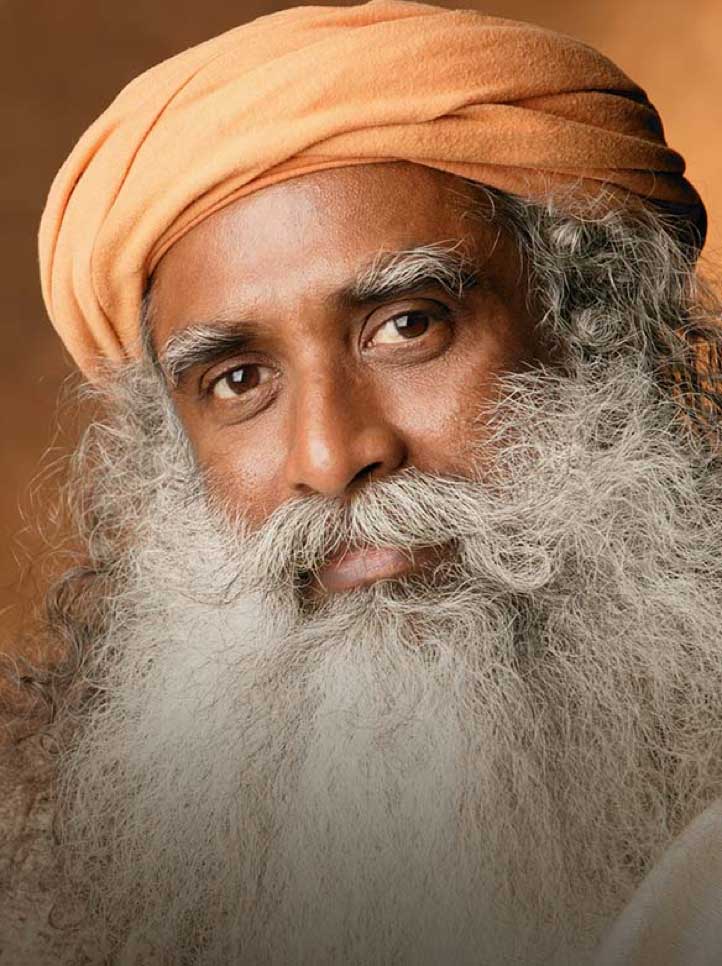
Founder of Isha Foundation
Living in New York City can be both a blessing and a curse in equal parts. The city’s energy is off the charts making life a collision of long-term ambitions and short-term pleasures; where food, fashion, music, social media and relationships carousel through your days, seemingly at light speed.
In an attempt to understand it all, we slow down. Go on a retreat. Read a book. Attend a yoga class. Start a new podcast. Somedays, meditation works best, allowing us to unpack the confusion of our lives and giving us brief moments of reflection.
We juxtapose the fast-paced with slowing down in a desperate attempt to make sense of it all, to find a livable balance.
Moving to the city that never sleeps forced me to spend time in introspection, my new drug of choice. During this time, I discovered Sadhguru, Founder of Isha Foundation, through the ever-inspiring Arianna Huffington, but came to follow his work closely through a compelling interview he did for Valentino and Visionary Women titled “The Ultimate Intelligence.” Following that interview, and five-hundred and twenty-two interviews later, I realized that he added clarity to my days, revealed the root cause of my fears and helped me navigate situations with much ease. So, when presented with the opportunity, I pulled out my journal of unanswered life questions and asked three burning questions to the most insightful person I know. Here is our interview:
Bhavna: Why do bad things happen to good people? Is there some explanation for this?
Sadhguru: Everyone thinks they are a good person. That is the whole problem.
It is always someone else who is a bad person. What is good and bad in the world is essentially a social aspect. Everyone has their own values of right and wrong, good and bad. If you look back on the societies of the world, everybody created their own idea of good and bad depending upon how it was necessary for their lifestyles at that time of history, in that part of the world.
Being good or bad is just a question of the way you think. It is not a parameter for determining what happens to you. Existence does not care whether you are good or bad. If you are in tune with something, it works for you. If you are not in tune, it does not work for you.
If you are “bad,” will the air refuse to give you oxygen, will flowers refuse to bloom for you, or will the sun refuse to give its warmth? Will food refuse to give its nourishment? When the creation itself is not making any distinction between good and bad, who are you to sit in judgment?
– Sadhguru
People who think they are good are always wondering, “I am such a good person, but my business is not working properly. My neighbor is such an evil man, but his business is going on well. Why is God not helping me?” You may be good, but if you don’t do the right things to be successful, you are not going to be successful. If you are a bad engineer, the building you put up will fall. Your goodness is not going to make it stand. Someone else may be everything that you think of as bad, but if he is a good engineer, his building will stand. So, every situation needs to be handled as it should be handled.
Bhavna: Since the invention of social media, we are living in an age of over-expression. Why is receiving attention (likes, hearts, views) such an alluring concept and how does this affect our psyche?
Sadhguru: If you get into this attention-seeking mode, it can cost you a lot later on in life. You will not know how to simply be yourself.
If someone has to keep telling you, “You are doing great,” all the time, you will become a product of other people’s opinions.
If you enjoy praise and accolades, you will inevitably suffer criticism. When people tell you how good and wonderful you are, you will be floating on cloud nine. When they tell you otherwise or simply ignore you, you will crash. -Sadhguru
There was a time when if I said, “I love you,” it meant I was including you as a part of me for the rest of my life and beyond. But today, “I love you” has become one of the most meaningless things. People love their car, their clothes, their lipstick! I am not saying it is right or wrong, it is just that it makes what could be a profound aspect of life into something flaky.
Another thing that young people must understand is that, particularly with digital media, the damn thing stays there for your lifetime. You may delete it from your Facebook account, but it will still be stored somewhere, and this may come and confront you later when it is not necessary in your life. What you are today may be embarrassing for you ten years later.
I am not against technology. Technologies were created to support human beings to better their life. If you use it properly, social media can be a wonderful tool. These are conveniences that have come our way, but how we employ them into our lives is the question. People have a dozen love affairs going on Facebook, but they cannot get along with the people around them. This is because on social media, you can say pretty things to someone and then move on, but if you have to actually love somebody next to you, it costs life. It takes involvement.
It takes involvement to know life. Without being involved, you cannot experience anything, whether it is the food that you eat, your relationships with people or the situations in which you exist.
Where there is no involvement, there is no experience of anything. It is the depth and intensity of involvement which allows a human being to take the experience of what he or she is doing to a certain level of richness and profoundness within themselves. How deeply you are involved, that is how profound your experience of life is.
-Sadhguru
If you explore this, you would use it gracefully to the extent it is necessary to facilitate your life. A human being should always focus on how to enhance their way of being. Then, everything else gets managed naturally. Whether it is your profession, your relationship or whatever else in your life, it will happen to its best only when who you are is enhanced.
Technology is never bad or good. It has no quality of its own – it is the way in which we use it. Whatever other technologies you handle – your phones, computers and social media – it is a much lesser technology than the human mechanism. This is the highest and the most sophisticated technology. You should attend to this first.
Bhavna: Do we as human beings have free will/freedom of choice or is there a predestined path?
Sadhguru: Nothing is predetermined, not even death. Everything has been created by you.
The problem is you create most of it unconsciously, so you think it is being heaped upon you from somewhere else. You have unconsciously written a certain software for yourself, which develops certain tendencies. So, no matter what you try to do, it compulsively tends to move only in a particular direction because that is the way your software is.
This does not mean you cannot redirect yourself. If you can create something unconsciously, you can also create it consciously. But it needs an effort beyond body and mind to completely change this software and put it in a different direction. This is the whole effort of all spiritual processes – to see that you create your life consciously instead of creating it unconsciously and blundering through. Once you make that effort, you will see more and more of your life becomes self-determined, not pre-determined.
If you gain mastery over your body, mind and energies, you will be 100% the master of your destiny.
– Sadhguru
If you have mastery over your physical body, 15 to 20% of your life and destiny will be in your hands. If you have mastery over your mind, 50 to 60% of your life and destiny will be in your hands. If you have mastery over your very life energy, 100% of your life and destiny will be in your hands to such an extent that every moment of your life can become self-determined.
You can start this process of moving from compulsiveness to consciousness today. A practical way to start is for a certain period of time, do those things that you don’t like. This is not the only way of course, there are other subtler and more effective ways, but this can be one way to begin. Those things that you like, you can do them quite easily and unconsciously but whatever you dislike, you can only do it consciously.
Suppose you have to speak to someone that you dislike, you will be conscious of every word that you utter to them and every step that you take. But, while chatting with your friend, you simply blabber on without a record of what you are saying. That person who you dislike, you can’t stand that person, their very sight creates all kinds of negative things within you, but if you go and talk to them and work with him joyfully, many limitations within you will break.
If you do what you like with 100% involvement, then you must do what you don’t like with 200% involvement. That’s breaking limitations in your life.
– Sadhguru

